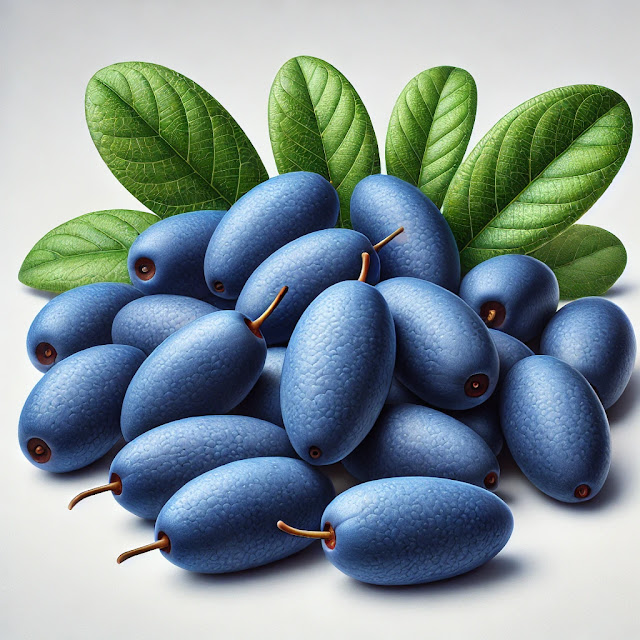Plums: A Sweet and Juicy Superfruit Packed with Nutrients
Overview:
Plums are a delicious and juicy fruit, known for their smooth, dark purple skin and sweet-tart flavor. They are enjoyed fresh, dried, or used in various culinary dishes. Plums not only bring a burst of flavor but are also rich in nutrients that provide multiple health benefits. Their versatility makes them a favorite in desserts, jams, and even savory dishes.
Calories and Key Nutrients (per 100g):
A 100g serving of plums contains about 46 calories, making it a low-calorie fruit. Plums are a good source of vitamins A, C, and K. They are also rich in dietary fiber, which aids digestion. The antioxidants in plums, such as anthocyanins, contribute to their deep purple color and support heart health. Compared to other fruits like peaches or nectarines, plums offer a slightly higher antioxidant content, making them a great choice for promoting overall health.
Health Benefits:
Plums are packed with health-boosting nutrients. The high vitamin C content helps to boost the immune system and protect against infections. The fiber in plums supports digestive health, helping to prevent constipation and promote gut health. Plums are also rich in antioxidants, which can help reduce inflammation and protect the body against oxidative stress. Their high vitamin K content supports bone health, and potassium helps regulate blood pressure.
Proper Consumption Methods:
Plums can be enjoyed fresh, making them an ideal snack. Simply wash the fruit, slice it, and remove the pit. They can also be added to fruit salads or blended into smoothies for a refreshing treat. In cooking, plums can be stewed or baked into pies, tarts, and crumbles for a sweet dessert. They can also be used in savory dishes such as sauces or marinades to add a tangy flavor.
Tasty Ways to Eat Plum (Recipes):
A delicious way to enjoy plums is by making a plum compote. Simmer fresh plums with a bit of sugar and spices to create a thick, tangy sauce that can be used on pancakes or yogurt. Another option is a plum crumble, where sliced plums are baked with a sweet, crunchy topping for a warm, comforting dessert. Plums can also be incorporated into salads, pairing well with cheese, nuts, and greens.
Cautions When Eating Plums:
While plums are safe for most people, overconsumption of dried plums (prunes) can lead to digestive issues, as they contain high amounts of fiber and natural sugars. Individuals who have difficulty digesting high-fiber foods should eat plums in moderation. Additionally, some people may have allergies to stone fruits, including plums, and should avoid them if they experience any allergic reactions.
Comparing Plums to Other Fruits:
When compared to fruits like peaches or apricots, plums contain higher levels of antioxidants and are lower in calories. While peaches provide more vitamin C, plums stand out for their rich anthocyanin content, which is beneficial for heart health and reducing inflammation. Both fruits offer health benefits, but plums provide a more robust defense against oxidative stress due to their darker skin pigments.
Who Should Eat Plums and Who Should Avoid Them:
Plums are a great choice for individuals looking to boost their digestive health due to their fiber content. They are also beneficial for athletes or those needing to regulate blood pressure, thanks to their potassium levels. However, individuals with sensitivities to high-fiber foods or those with stone fruit allergies should limit their intake of plums.
Interesting Stories or Facts:
Did you know that plums were one of the first fruits domesticated by humans? The history of plums dates back over 2,000 years, with origins in China. In ancient Rome, plums were a prized delicacy and were often dried and preserved to be enjoyed year-round. Today, plums remain a popular fruit worldwide and are celebrated in various cultural dishes.
Plum Culture Around the World:
In China and Japan, plums are fermented to create a popular alcoholic beverage called plum wine (umeshu). In the Middle East, plums are often used in savory dishes like stews and tagines, where their tart flavor balances the richness of meats and spices. In the West, plums are commonly used in desserts, jams, and jellies, providing a sweet and tangy flavor to baked goods.
Scientific Research on Plums:
Recent research suggests that plums may help improve bone density, particularly in postmenopausal women. Their high antioxidant content has been linked to a reduced risk of chronic diseases, including heart disease and certain cancers. Studies have also highlighted plums' role in regulating blood sugar levels, making them a good option for individuals with diabetes or those at risk of metabolic disorders.
Conclusion:
Plums are a nutrient-dense fruit with a range of health benefits, from supporting heart and bone health to aiding digestion. Whether enjoyed fresh, dried, or used in cooking, plums are a versatile and delicious addition to any diet. However, as with any food, it’s important to enjoy them in moderation to avoid any potential digestive discomfort.
This information may not be entirely accurate, so if you have any medical conditions, please consult a doctor before consuming plums.





.%20The%20whole%20horned%20melon%20should%20be%20bright%20orange%20with%20distinctive.webp)





Comments
Post a Comment